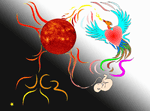« It is an eternal experience that every man who has power
is inclined to abuse it ; until he finds limits. » De l'esprit des lois.
Montesquieu. |
« To claim to govern the city
one must learn to govern oneself » Alcibiades. |
The return to sensitive communication
according to ancient civilisations.
3 - The evolution of human communication (continued) :
After the wisdom resulting from acquired experience, capable of defining rules of behaviour recognised by all, a regression in behaviour takes place.In the face of this fragile collective consciousness, a guide is needed.
In Moses, we see a dialogue developing between his desires, his doubts, his anger, and his God, who manifests himself as an inner voice with which he must come to terms. This voice indicates the difficulties he will encounter, at a time when violent impulses arise in him against those who flout his authority.
God is the voice of experience, trying to guide him along the path to peace and freedom.
B – Human evolution, its advances and regressions :
Bible Gateway - Exodus 32 : 1-35
Exodus 32 : 1
When the people saw that Moses was slow to come down from the mountain, they gathered round Aaron, and said, "Come, make us gods who will go before us. As for this fellow Moses who brought us up out of Egypt, we don’t know what has happened to him".
When the people saw that Moses was slow to come down from the mountain, they gathered round Aaron, and said, "Come, make us gods who will go before us. As for this fellow Moses who brought us up out of Egypt, we don’t know what has happened to him".
Men have achieved freedom thanks to a leader capable of guiding them. But their evolution has barely begun : they are still children dependent on a protective and educational authority. Believing they have lost their guide, they return to their old beliefs. If they can't see the real world, they need tangible support.
Without an authority to force them to change their habits
people struggle to change.
people struggle to change.
Exodus 32 : 2
Aaron answered them, “Take off the gold earrings that your wives, your sons and your daughters are wearing, and bring them to me.”
Aaron answered them, “Take off the gold earrings that your wives, your sons and your daughters are wearing, and bring them to me.”
Moses acts as a responsible man. While leading his people towards freedom, he chose to isolate himself to find the answers to his questions.
For his part, Aaron appears as the archaic facet of Moses, still attached to the past and capable of leading the people back to their ancient beliefs [cf : Apis, Moloch]. People naturally trust him because he reassures them by responding favourably to their desires.
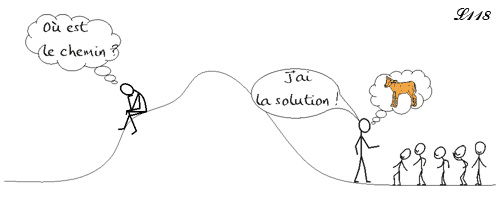
« Proven solutions are reassuring. »
Exodus 32 : 3
So all the people took off their earrings and brought them to Aaron.
So all the people took off their earrings and brought them to Aaron.
« That reassures gets ! »
Exodus 32 : 4
He took what they handed him and made it into an idol cast in the shape of a calf, fashioning it with a tool. Then they said, “These are your gods, Israel, who brought you up out of Egypt.”
He took what they handed him and made it into an idol cast in the shape of a calf, fashioning it with a tool. Then they said, “These are your gods, Israel, who brought you up out of Egypt.”
For a people still blind and unadapted to freedom, rediscovering their ancient beliefs and images of their gods is reassuring.
What's more, the new support for their beliefs was not an adult animal, but the cow's calf. Although it has instinctive knowledge of its needs, its instincts have not yet had time to integrate into a community.
Immature people naturally give themselves the god that corresponds to the evolution of their consciousness.
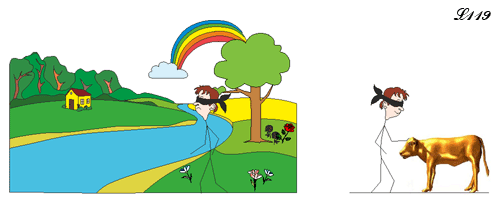
For those who cannot see, touch is reassuring.
Exodus 32 : 5
When Aaron saw this, he built an altar in front of the calf and announced, “Tomorrow there will be a festival to the Lord.”
When Aaron saw this, he built an altar in front of the calf and announced, “Tomorrow there will be a festival to the Lord.”
Aaron knows that the festival is an essential way of giving thanks to a patron god.
Exodus 32 :6
So the next day the people rose early and sacrificed burnt offerings and presented fellowship offerings. Afterward they sat down to eat and drink and got up to indulge in revelry.
So the next day the people rose early and sacrificed burnt offerings and presented fellowship offerings. Afterward they sat down to eat and drink and got up to indulge in revelry.
The immaturity of men is evident in every one of their actions. They do not act to organise their lives, but, like children, they take an interest in their new toy and then content themselves with satisfying their immediate needs : eating, entertainment, sleep.
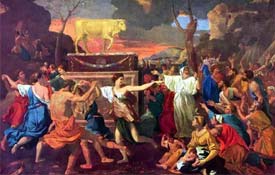
The Feast of the Golden Calf. Nicolas Poussin
Exodus 32 : 7
Then the Lord said to Moses, “Go down, because your people, whom you brought up out of Egypt, have become corrupt."
Then the Lord said to Moses, “Go down, because your people, whom you brought up out of Egypt, have become corrupt."
There are two ways of understanding the text here.
1 - The god, like any person who runs a state, cannot stoop to educating his people. Having become aware of the situation, he needs a minister to intervene.
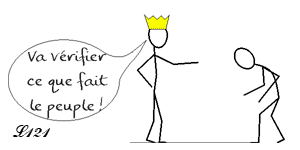
His experience enabled him to anticipate the difficulties to come.
It is this vision of Moses that we are going to look at: for us, the god here would be Moses' unconscious [cf : L'inconscient anticipe - in french].

« Doubt, whether justified or not, triggers an inner dialogue. »
Exodus 32 : 8
"They have been quick to turn away from what I commanded them and have made themselves an idol cast in the shape of a calf. They have bowed down to it and sacrificed to it and have said, ‘These are your gods, Israel, who brought you up out of Egypt."
"They have been quick to turn away from what I commanded them and have made themselves an idol cast in the shape of a calf. They have bowed down to it and sacrificed to it and have said, ‘These are your gods, Israel, who brought you up out of Egypt."
Moses knows how to listen to the voice within him that makes him foresee difficulties.
He knows the possible behaviours of a childlike people.This people, nourished by the beliefs and images of the gods of Egypt, is unlikely to set off in the right direction on its own.
Exodus 32 : 9
“I have seen these people,” the Lord said to Moses, “and they are a stiff-necked people."
“I have seen these people,” the Lord said to Moses, “and they are a stiff-necked people."
Moses' intuition comes from the role he has played between Pharaoh and his enslaved people : he knows the reasons of the one and feels the needs of the other.
A people reduced to slavery has no experience other than obeying the directives imposed from childhood : a stiff neck indicates this inability to turn their gaze anywhere other than in the direction they already know.
This is another example of the importance of the leader and his knowledge of people. It is as the representative of a just ‘evolution-god’ that he will be able to guide his people along the path of life.
Exodus 32 : 10
"Now leave me alone so that my anger may burn against them and that I may destroy them. Then I will make you into a great nation.”
"Now leave me alone so that my anger may burn against them and that I may destroy them. Then I will make you into a great nation.”
At that time, mentalities had not yet evolved : only punishment could control excesses, and Moses could not escape violent impulses.
Conversely, the person who knows how to be obeyed will become the leader of a great nation.
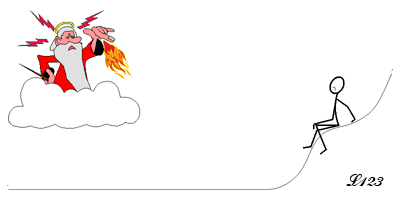
« Supreme leaders
have difficulty accepting disobedience. »
have difficulty accepting disobedience. »
Exodus 32 : 11
But Moses sought the favor of the Lord his God. “Lord,” he said, “why should your anger burn against your people, whom you brought out of Egypt with great power and a mighty hand ?"
But Moses sought the favor of the Lord his God. “Lord,” he said, “why should your anger burn against your people, whom you brought out of Egypt with great power and a mighty hand ?"
This passage can be understood in three different ways:
1 - Moses speaks to God and, like Joseph and Jacob, negotiates with him.
2 - If God is only a powerful and authoritarian ‘Lord’ [cf : Gifts of land to the Hebrews], we can suppose that Moses finds in this passage the words he might have used when negotiating with Pharaoh for the freedom of his people.
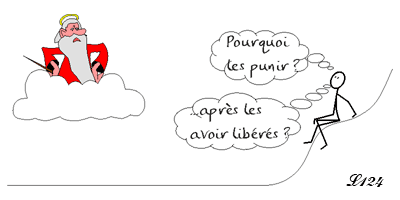
3 - We can also assume that this dialogue is an inner one, between two opposing forces within him : compassion and anger.
He is the father who loves his children and wants them to be happy, while at the same time finding it hard not to be blindly obeyed.
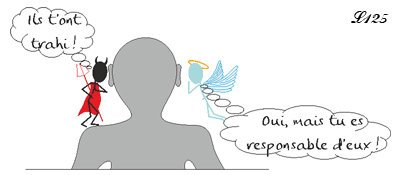
Exodus 32 : 12
"Why should the Egyptians say, ‘It was with evil intent that he brought them out, to kill them in the mountains and to wipe them off the face of the earth’? Turn from your fierce anger; relent and do not bring disaster on your people."
"Why should the Egyptians say, ‘It was with evil intent that he brought them out, to kill them in the mountains and to wipe them off the face of the earth’? Turn from your fierce anger; relent and do not bring disaster on your people."
By questioning God's anger, Moses is addressing his own violent impulses.
Exodus 32 : 13
"Remember your servants Abraham, Isaac and Israel, to whom you swore by your own self: ‘I will make your descendants as numerous as the stars in the sky and I will give your descendants all this land I promised them, and it will be their inheritance forever.’”
"Remember your servants Abraham, Isaac and Israel, to whom you swore by your own self: ‘I will make your descendants as numerous as the stars in the sky and I will give your descendants all this land I promised them, and it will be their inheritance forever.’”
A people can only truly evolve if the authority that has guided it recognises its mistakes.
Moses drew on the history of his ancestors to learn from his own experience.
We can see here the inner journey of a man who confronts his religious convictions with the maturation of his thought.
Can Moses give up guiding his people despite the promises he has made to them ?
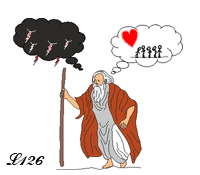
Moses between anger and compassion.
Exodus 32 : 14
Then the Lord relented and did not bring on his people the disaster he had threatened.
Then the Lord relented and did not bring on his people the disaster he had threatened.
In an instant, everything is reversed. The compassionate leader has just triumphed over the leader wounded in his pride.
No one can be just if he is guided by his impulses. Compassion must continue to underpin his governance.
Here we find the opposition between the reason that governs and the heart that feels and brings its own knowledge of the world.
Moses has just made an important choice: he has fully chosen his rediscovered sensitivity and compassion.
Exodus 32 : 15
Moses turned and went down the mountain with the two tablets of the covenant law in his hands. They were inscribed on both sides, front and back.
Moses turned and went down the mountain with the two tablets of the covenant law in his hands. They were inscribed on both sides, front and back.
Each rule of life is written in two ways:
- one, written on the visible side, is most often experienced as a coercive law,
- The other is written on the invisible side, and can only be read by those who feel that behind the law lies the heart and respect for all beings and all things.
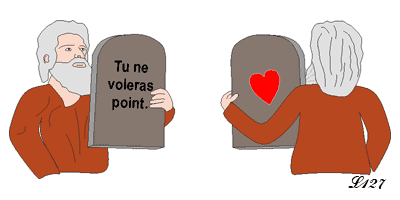
Exodus 32 : 16
The tablets were the work of God ; the writing was the writing of God, engraved on the tablets.
The tablets were the work of God ; the writing was the writing of God, engraved on the tablets.
A written law is addressed to reason and has no other purpose than to regulate relations within society. It differs from the moral sense which only comes into play if we act for both our own good and that of others. However, this law is inspired by it to establish its rules.
We find here the way in which evolution unfolded [cf : l'évolution des moyens de communication] : it began with the development of sensitive perception, then, with the need to communicate, languages appeared and succeeded one another in different forms: body language, facial expressions, vebal language.
Exodus 32 : 17
When Joshua heard the noise of the people shouting, he said to Moses, “There is the sound of war in the camp.”
When Joshua heard the noise of the people shouting, he said to Moses, “There is the sound of war in the camp.”
While Aaron is close to the people, Joshua is close to Moses : they represent two other facets of Moses' personality.
Aaron is the one who hears the needs of the people. Joshua, on the other hand, interprets the cries he hears in his own way, without feeling what they express.
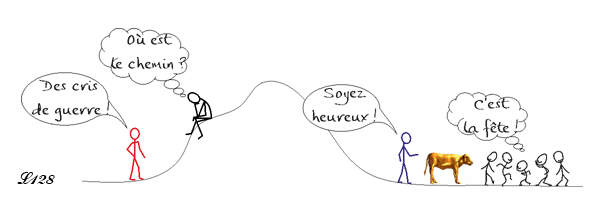
Exodus 32 : 18
Moses replied: “It is not the sound of victory, it is not the sound of defeat ; it is the sound of singing that I hear.”
Moses replied: “It is not the sound of victory, it is not the sound of defeat ; it is the sound of singing that I hear.”
Moses doesn't judge negatively, he listens, able to describe what he hears and feels.
But has his inner workings been fully realized ? If he is capable of empathy, will he be able to make it triumph ?
Exodus 32 : 19
When Moses approached the camp and saw the calf and the dancing, his anger burned and he threw the tablets out of his hands, breaking them to pieces at the foot of the mountain.
When Moses approached the camp and saw the calf and the dancing, his anger burned and he threw the tablets out of his hands, breaking them to pieces at the foot of the mountain.
Confronted with the spectacle of his people's regression, he regresses himself, and allows the all-powerful Lord to resurface within him, ready to consume his people [cf. Exodus 32:10].
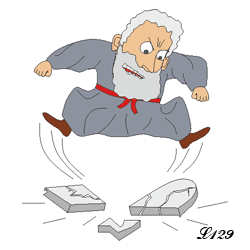
Here we find a characteristic of the human personality : it is capable of understanding life through reasoning, capable of explaining it in writings that fill entire libraries, but it fails to apply this knowledge.
Exodus 32 : 20
And he took the calf the people had made and burned it in the fire; then he ground it to powder, scattered it on the water and made the Israelites drink it.
And he took the calf the people had made and burned it in the fire; then he ground it to powder, scattered it on the water and made the Israelites drink it.
Despite the accumulated knowledge, the exercise of wisdom is difficult when anger arises.
Moses punishes!
Exodus 32 : 21
He said to Aaron, “What did these people do to you, that you led them into such great sin?”
He said to Aaron, “What did these people do to you, that you led them into such great sin?”
Moses looked for a scapegoat. First of all, it was his servant Aaron.
In this sense, he put on the garb of the almighty god who was preparing to punish his people for their disobedience [cf. Exodus 32:10].
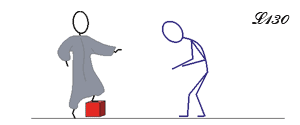
Exodus 32 : 22
“Do not be angry, my lord,” Aaron answered. “You know how prone these people are to evil.
“Do not be angry, my lord,” Aaron answered. “You know how prone these people are to evil.
Aaron, another facet of Moses, shifts the blame onto the people.
Each event leads to a chain reaction to determine who is responsible and what solution needs to be found.

Exodus 32 : 23
They said to me, ‘Make us gods who will go before us. As for this fellow Moses who brought us up out of Egypt, we don’t know what has happened to him.’
They said to me, ‘Make us gods who will go before us. As for this fellow Moses who brought us up out of Egypt, we don’t know what has happened to him.’
We have seen the different paternalistic personalities of Moses, authoritarian or compassionate.
Aaron shows himself to be a father who does not seek conflict and grants his children whatever they ask of him.
Exodus 32 : 24
So I told them, "Whoever has any gold jewelry, take it off. Then they gave me the gold, and I threw it into the fire, and out came this calf!”
So I told them, "Whoever has any gold jewelry, take it off. Then they gave me the gold, and I threw it into the fire, and out came this calf!”
He prefers to justify himself rather than take responsibility for his actions.
Exodus 32 : 25
Moses saw that the people were running wild and that Aaron had let them get out of control and so become a laughingstock to their enemies.
Moses saw that the people were running wild and that Aaron had let them get out of control and so become a laughingstock to their enemies.
Moses, for his part, cannot accept the dishonor that affects his people and reflects on him.
Exodus 32 : 26
So he stood at the entrance to the camp and said, “Whoever is for the Lord, come to me.” And all the Levites rallied to him.
So he stood at the entrance to the camp and said, “Whoever is for the Lord, come to me.” And all the Levites rallied to him.
We have seen the different personalities of Moses, compassionate or authoritarian.
Now he is back in charge of his people.
Will he do so as a democratic leader, or as an autocrat ?
Will he guide or punish ?
Exodus 32 : 27
Then he said to them, “This is what the Lord, the God of Israel, says: ‘Each man strap a sword to his side. Go back and forth through the camp from one end to the other, each killing his brother and friend and neighbor.’”
Then he said to them, “This is what the Lord, the God of Israel, says: ‘Each man strap a sword to his side. Go back and forth through the camp from one end to the other, each killing his brother and friend and neighbor.’”
A liberated people can fall back into their mistakes. The same applies to the guide who, having fought against tyranny, also becomes a tyrant.
Just when order seemed to have been restored, Moses allows himself to be carried away by anger: only the death of the guilty parties is the solution. To justify his decision, he invokes the word of God.
Exodus 32 : 28
The Levites did as Moses commanded, and that day about three thousand of the people died.
The Levites did as Moses commanded, and that day about three thousand of the people died.
Moses was transformed into a bloodthirsty leader in the image of his god.
It is a long and difficult road from the moral sense he recognised inwardly to putting it into practice.
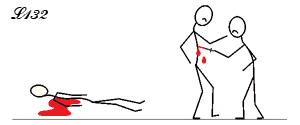
Exodus 32 : 29
Then Moses said, “You have been set apart to the Lord today, for you were against your own sons and brothers, and he has blessed you this day.”
Then Moses said, “You have been set apart to the Lord today, for you were against your own sons and brothers, and he has blessed you this day.”
We can see how progress can vanish in a short time : evolution has just turned into regression.
Examples of such massacres can be found down the centuries, whether religiously or politically motivated. 25 centuries later, in another part of the world, we will see the same massacres blessed by a patriarch claiming to be of the same god.
« The law is indispensable
when sensitive perception is lost.
It applies to the people as well as to the ruler,
as it does to the ruler. »
when sensitive perception is lost.
It applies to the people as well as to the ruler,
as it does to the ruler. »
---------------------------
Moses' inner dialogue will now become a dialogue with the god.
Unable to accept his disobedience, Moses blamed and punished his people.
He will now justify himself by invoking the Eternal to support his decisions..
----------------------------
Exodus 32 : 30
The next day Moses said to the people, “You have committed a great sin. But now I will go up to the Lord; perhaps I can make atonement for your sin.”
The next day Moses said to the people, “You have committed a great sin. But now I will go up to the Lord; perhaps I can make atonement for your sin.”
Moses has abandoned all empathy. He is guided only by his role as representative of a sovereign god.
He recognizes a single sin : disobedience. His “all-powerful” god became his only justification.
Exodus 32 : 31
So Moses went back to the Lord and said, “Oh, what a great sin these people have committed! They have made themselves gods of gold.
So Moses went back to the Lord and said, “Oh, what a great sin these people have committed! They have made themselves gods of gold.
In addressing his god, Moses is acting as a prosecutor condemning an act of lèse-majesté.
He is awaiting divine judgement.
Exodus 32 : 32
"But now, please forgive their sin—but if not, then blot me out of the book you have written.”
"But now, please forgive their sin—but if not, then blot me out of the book you have written.”
Moses can only forgive his people with the consent of his god.
Exodus 32 : 33
The Lord replied to Moses, “Whoever has sinned against me I will blot out of my book.
The Lord replied to Moses, “Whoever has sinned against me I will blot out of my book.
For Moses' god, the only guilty party is the one who doesn't blindly obey.
Exodus 32 : 34
"Now go, lead the people to the place I spoke of, and my angel will go before you. However, when the time comes for me to punish, I will punish them for their sin.”
"Now go, lead the people to the place I spoke of, and my angel will go before you. However, when the time comes for me to punish, I will punish them for their sin.”
The people had already been punished by Moses, but that's not enough : the god of Moses is preparing his own revenge.
Exodus 32 : 35
And the Lord struck the people with a plague because of what they did with the calf Aaron had made.
And the Lord struck the people with a plague because of what they did with the calf Aaron had made.
When he strikes, it is as an autocrat, because his people do not share his vision of the world.
The evolution of man has been aborted, because the written law has proved incapable of transforming souls.
« Mere respect for an established order is no substitute for empathy.
substitute for empathy and respect for others. »
substitute for empathy and respect for others. »
So, in this remote period in the history of the Middle East, the scribes were perfectly aware of the failings of the people, as well as those of their leaders.
Every era has had its share of visionaries [cf : the influence of Hammurabi's code on the Hebrews.] capable of speaking to a blind people who, even today, remain deaf to their enlightened advice.
« To lead a people to freedom, it is essential to have a well-developed moral sense. »
4 - The miracle of empathic communication : (continued)
Bibliographie :

